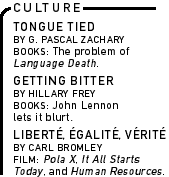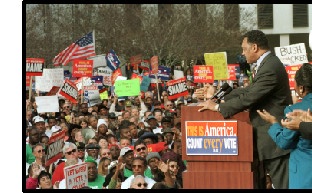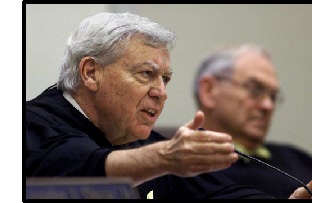
|

|

|

|
| |
|
|||
|
The next president--whoever he may be--will serve under a cloud of suspicion, his legitimacy always in question. That is partly a result of the close election and the thoroughly compromised Florida vote count, but it is also a legacy of a flawed political system whose undemocratic inadequacies have become increasingly apparent. At some point, the electoral machinery will grind out a result, and someone will be the
More importantly, the election crisis opens up new possibilities for challenging the legitimacy of some aspects of our inherited political institutions and processes, and forcing a debate on what democracy could and should mean in the 21st century. It is simply the latest, most dramatic development in a series of unfolding crises of American democracy that unfortunately so far have produced more cynicism and withdrawal than protest or demands for deep-seated reform. Debates about process and institutional forms normally leave most people cold, but the outrages of the 2000 presidential election might spur even highly pragmatic citizens to see the link between how we go about selecting government leaders and the results we get from government. At press time, Bush still seemed on course to his narrow victory, despite persuasive
There undoubtedly will be challenges to the Electoral College, which has been tainted by anti-popular elitism and the special interests of the slaveholding states from its origins, and which no longer plausibly provides enough benefits to offset its great disadvantages. Small states, which wield disproportionate power because of the Electoral College, have an interest in preserving it, but even their citizens may conclude that it is no longer a legitimate institution. The institutional crisis, however, goes far beyond the Electoral College to a broader sense that existing politics does not serve most people or democratic ideals. Despite the great odds against third parties, there has been a higher level of support for the idea of alternative parties than indicated in the campaigns of Perot, Nader and others. There is widespread sentiment that the debate is too narrow and, with both candidates this time trying to steal the other's thunder, too muddled and confusing. Popular frustration with the choices--a sense especially among many lower-income working people that nobody is speaking to their needs and interests--is likely one of the contributors to another of the more serious signs of systemic illegitimacy: the steady decline in the percentage of eligible people who vote (barely over half this year). Their dropping out is less a sign of happy acquiescence with the way things are than a statement that they see little connection between politics and their lives. Despite earlier failures in enacting campaign finance reform, this $4 billion election, with cash flooding through the loopholes, has increased revulsion at the influence of money in politics. John McCain's appeal in the Republican primaries was one sign of the popularity of such reforms. Perhaps more than anything else, the money primary, which is the initial hurdle for candidates and a severe constraint on the range of ideas in politics, has undermined the sense of legitimacy of American democracy. When candidates are commodities, campaigns are marketing exercises and elections are for sale, there is no reason for people to trust and respect political institutions or leaders. Ironically, the Republicans, the supposed guardians of original constitutional intent and conservative heritage, have escalated the attack on the legitimacy of political institutions during the Clinton years. From the beginning of Bill Clinton's term, Republicans denied his legitimacy, though his claim on the office was far stronger than Bush will have if he is sworn in. Their politics of scandal, using the now nearly forgotten Whitewater case as the opening for an unending attempt to overturn Clinton's presidency, culminated in the impeachment case that was finally stopped mainly because the majority of Americans clearly opposed it. The Democrats are no saints on any of these counts--fundraising abuses, scandal politics, suppression of debate--but the Republican assault on Clinton exacerbated the growing public disillusionment with politics. In general, such disillusionment serves Republican anti-governmental ends. But if Bush enters the White House, he may find that Florida is his Whitewater, an unending series of scandals that undermine his own claim to power beyond anything that Clinton faced. Whatever happens in the courts and the counts, progressives should continue, paraphrasing Jesse Jackson, to keep Florida alive. There are too many important questions about what happened in the Florida election to throw in the towel, even if Gore is forced to concede. The objective should not be simply further crippling Bush, but rather opening a broad discussion about remaking democracy to guarantee popular power, to reduce the power of monied interests, and to protect the rights of individuals and minorities. Democracy is--or should be--more than voting, but if votes aren't even accurately counted, democracy is a fraud and there's less reason for anyone to head to the polls. This year's balloting could have been a civics lesson in how every vote can count; instead it has showed how many votes don't. The Florida fiasco (which could have been repeated in many other states) demonstrated that America doesn't take democracy seriously enough to make even the modest investments needed for technical reliability. There are far superior technologies to punching ballots, such as optical scanners at the polls that give voters immediate feedback about potential errors. And if they generate paper records that can be verified, computers should open possibilities for even more accurate methods. Like nearly everything else in the election, the failure to invest in reliable voting technologies was skewed. The Washington Post, New York Times and Miami Herald all reported that black voters, overwhelmingly Gore supporters, were much more likely to use voting equipment that had far higher rates of rejection and error than were white voters. For example, the Herald reported that 88 percent of precincts where more than a fifth of ballots were rejected used punch cards. Punch cards were concentrated in urban Democratic districts. While 3.9 percent of all ballots were rejected in the punch card counties, only 1.4 percent of ballots were tossed out in the optical scanner counties. If the 185,000 Florida ballots that were unsuccessfully punched, marked for more than one candidate for an office, or otherwise rejected on technical grounds had been counted--assuming those ballots had been cast much like other votes in the same precinct--Gore would have won the state by more than 23,000 votes, according to an analysis prepared by Arizona State University journalism professor Stephen Doig for the Herald. Even assuming, unrealistically, that as many as 90 percent of those voters really intended not to vote for anyone for president, Gore would still have won by 1,443 votes. Eventually, as Salon reporter Jake Tapper noted, there will be recounts of these votes by journalists, academics and others who can get access to the ballots, thanks to Florida's admirable sunshine laws. If Bush becomes president, his stature won't rise when it's reported that he didn't really win the majority in Florida (and thus of the Electoral College). He ultimately will owe any potential victory to the Republican scorched-earth crusade to stop the partial hand recount of votes in counties with clear problems as well as the full statewide hand recount that was the best and most accurate option available to determine the victor. Meanwhile, the Justice Department is investigating the accumulating evidence of widespread obstacles to blacks trying to cast their ballots (see below). For example, last summer Secretary of State Katherine Harris distributed a list of 700,000 voters who were to be disqualified from voting because they had committed a felony. But many African-Americans who had never committed felonies or who had previously arranged to restore their voting rights reported that they were stripped from the rolls. According to London's Observer, a disproportionate number of blacks were purged, even after accounting for different conviction rates. (The source of the grossly flawed list was reportedly a division of ChoicePoint, a firm whose owner is a major Republican financial contributor.) While better technical methods of counting votes, more politically
neutral election officials and national minimum standards for federal
elections would be a small step in the right direction, the election
crisis should lead to more wholesale reform: eliminating the Electoral
College, public financing of elections, instant-runoff ballots,
proportional representation, free access to television and radio--including
public debates--for candidates eligible for public financing, and
Election Day voter registration at the polls. Such reforms would
go a long way toward strengthening democracy and increasing the
political power of average citizens. They might even open the door
to more candidates who are worth a vote. If George Bush's victory
can help bring that about, it will undoubtedly be his greatest,
if entirely inadvertent, accomplishment.
|



